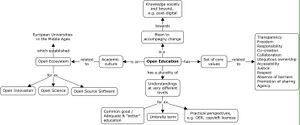Open Education Roadmap
Page under construction!
Introduction
A roadmap for Open Education in the Swiss Higher Education landscape has been drafted in 2021-2022. The output is available from this page. It is currently available in pdf format but will soon be available in wiki format for easy editing and commenting.
Within a SNSF scientific exchange, Swiss and international scholars have been working for 9 months on an Open Education project, driven by three aims:
- Draft a roadmap for Open Education in the Swiss Higher Education landscape to set an initial ground and open discussions to stakeholders, citizens and communities;
- Identify key stakeholders, ready to act as change agents in Swiss Higher Education institutions (HEIs) and take on leadership roles with regard to Open Education;
- Start a Swiss Open Education network to share and coordinate future actions.
What is Open Education? How is it related to Open Science and other Opens and Commons? Why does it matter for Higher Education institutions? Why does Open Education matter for each and every citizen?
This report provides an overview of Open Education to decision makers through these 4 questions and sets the ground to invite stakeholders, citizens and communities to actively contribute to the debate.
What is Open Education?
Many definitions of Open Education exist (e.g. Year of Open; Stracke, 2019, p. 184 “Open Education is designing, realizing, and evaluating learning opportunities with visionary, operational, and legal openness to improve learning quality for the learners”): and this diversity is characteristic of its openness. Below is a tentative definition of how we understand it today and a visual representation of its main characteristics (Figure 1).
Open Education is both an umbrella term and a complex ecosystem that operates on a number of very different levels. It is inherently open in the way it functions and cannot be captured by a single definition. It considers knowledge as a public good. Its intrinsic values of freedom and transparency assure contribution and access to the discovering of all forms of knowledge, under the sole condition of respecting authorisation to access it, e.g. indigenous knowledge. It is articulated around the remaining values of responsibility, sharing, justice, agency and ubiquitous ownership (Baker, 2017). It is neither synonymous of free nor of extractive approaches. It strives to find sustainable models at all levels – epistemic, legal, social, economic, political, ecologic, infrastructure, etc. Open Education represents an alternative approach that exists since the Middle Ages and is at the heart of the establishment of European universities (see for ex. Peter & Deimann, 2013, p. 9). It is a means (Paola Corti, 2022, private communication) to foster knowledge societies by leveraging collective human intelligence.
